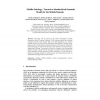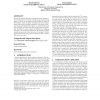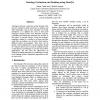SEMWEB
2007
Springer
14 years 5 months ago
2007
Springer
The development of ontologies involves continuous but relatively small modifications. Existing ontology reasoners, however, do not take advantage of the similarities between diffe...
OTM
2007
Springer
14 years 5 months ago
2007
Springer
The problem of inconsistency handling in ontologies has recently been attracting a lot of attention. When inconsistency occurs in an ontology, there are mainly two ways to deal wit...
ICSOC
2007
Springer
14 years 5 months ago
2007
Springer
Ontologies will be crucial for the future development of Next Generation Service Delivery Platforms. While various projects have defined ontologies for the mobile domain, there is ...
ER
2007
Springer
14 years 5 months ago
2007
Springer
This paper aims to bring the benefits of the use of Category Theory to the field of Semantic Web, where the coexistence of intrinsically different models of local knowledge mak...
DILS
2007
Springer
14 years 5 months ago
2007
Springer
Ontologies are heavily used in life sciences so that there is increasing value to match different ontologies in order to determine related conceptual categories. We propose a simpl...
DEXA
2007
Springer
14 years 5 months ago
2007
Springer
The semantic web is based on ontologies and metadata that indexes resources using ontologies. This indexing is called annotation. Ontology based information retrieval is an operati...
ATAL
2007
Springer
14 years 5 months ago
2007
Springer
Most of the proposed approaches in automatic service selection assume the existence of a common ontology among communicating agents. However, this assumption becomes difficult to...
AIME
2007
Springer
14 years 5 months ago
2007
Springer
With increasing popularity of using ontologies, many industrial and clinical applications have employed ontologies as their conceptual backbone. Ontologies try to capture knowledge...
ADAPTIVE
2007
Springer
14 years 5 months ago
2007
Springer
Ontologies and reasoning are the key terms brought into focus by the semantic web community. Formal representation of ontologies in a common data model on the web can be taken as a...
SEMCO
2007
IEEE
14 years 5 months ago
2007
IEEE
Ontologies form the cornerstone of the Semantic Web and are intended to help researchers to analyze and share knowledge, and as more ontologies are being introduced, it is difficu...




